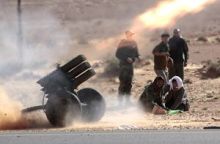Literally hours after the UN Security Council’s resolution on no fly zones over Libya, coalition forces hit military targets in that country. Sanctions against Libya were put to a vote late Thursday night and envisaged air raids on government tanks and heavy artillery to protect the civilian population. Russia, China, Germany, Brazil, and India abstained. Remarkably, the League of Arab States unanimously approved the resolution, allowing the Security Council to establish a no fly zone in Libya. At the time preventing Gaddafi from ordering air raids on the population was regarded as the highest priority.
Last Sunday, following the coalition’s air attacks, Russia’s foreign mi-nistry called on the states concerned to stop using force “indiscriminately.” The Chinese foreign minister voiced regret about the international coalition’s combat operations in Libya. A strange stand, indeed, for if you say “a,” you ought to say “b.” President Obama declared that the United States can’t just look on as a tyrant says his people cannot expect mercy. He reaffirmed that no US forces will take part in the ground operations.
President Viktor Yanukovych of Ukraine made a statement to the effect that the Security Council’s resolutions are binding on all member countries, and that Ukraine will act in strict accordance with them: “Ukraine believes that the efforts of all those involved in the situation in Libya should focus primarily on the protection and security of the civilian population, including Ukrainian nationals who remain in Libya.” Yanukovych stressed the clause of Resolution 1973 (2011) about the inadmissibility of any foreign occupation of Libyan territory.
Contrary to the expectations of many analysts, the revolution that started in Libya several weeks is following a totally different scenario than those in Tunisia or Egypt, where the powers that be succumbed to the opposition’s pressure and started making democratic changes. Gaddafi declared that the Benghazi-based opposition that had taken control over a number of major cities in the east of Libya was acting as an Al-Qaeda confederate, and engaged all of his military resources — elite troops, mercenaries, artillery, tanks, and aircraft — against his fellow countrymen. The West did not interfere at first, not until it became obvious that the rebels had nothing but enthusiasm, Kalashnikovs, and AAA guns (which they still had to learn to fire), and that the fall of Benghazi was but several days away. Gaddafi declared that, in the event of international interference, the West would know no peace. The UN Security Council has no mandate to interfere into Libya’s internal affairs, he added, and such interference is prohibited by the UN Charter. An attack on Libya would be tantamount to colonization and this would be totally unjustifiable. The Libyan ruler said he was prepared to open all armories and let the people defend Libya. His speech was broadcast in audio format and Gaddafi never appeared on screen. The government-run television network reported 48 persons killed and over 150 wounded by enemy fire. This information remains to be confirmed by independent sources.
Yesterday coalition forces continued to hit military targets in Libya. French media reports attacks on Libyan tanks and armored personnel carriers at dawn. The British defense ministry reports bomb raids on the key Libyan AAA targets and those near Tripoli. British and US warships have launched more than 120 Tomahawks. According to various military coalition sources, Libyan AAA facilities were the main targets of air raids, with at least 20 out of 22 destroyed. Coalition combat operations are coordinated from USS Mount Whitney, flagship of the Sixth Fleet, in the Mediterranean, with French, British, Canadian, and Italian liaison officers on board. On Sunday, the French aircraft carrier Charles de Gaulle set sail for Libya from the port of Toulon. It will take her 36 hours to approach the Libyan coast. After that the helicopters and other military aircraft on board will be within a 10-minute flight range.
The next stage of the combat operations may be a series of attacks on the Libyan government supply lines. Coalition spokesmen say they have no information about civilian casualties during the air raids. Vice Admiral Bill Gortney, director of the Joint Chiefs of Staff, says the coalition forces haven’t lost a single aircraft over Libya; that Belgium and Qatar have joined the US, British, and French forces; that the initial objectives have been reached by (a) setting up a no fly zone (so that not a single Libyan aircraft has been able to take off in the past two days); (b) stopping Gaddafi’s offensive on the insurgent political center of Benghazi by air raids on ground targets. The next phase of operations will be blocking all Libyan army supply routes.
Colonel Gaddafi’s days are numbered. The big question is who will replace him and what kind of regime will be established in this Arab country. This is anything but a rhetorical question for Ukraine, considering its interests in Libya.








